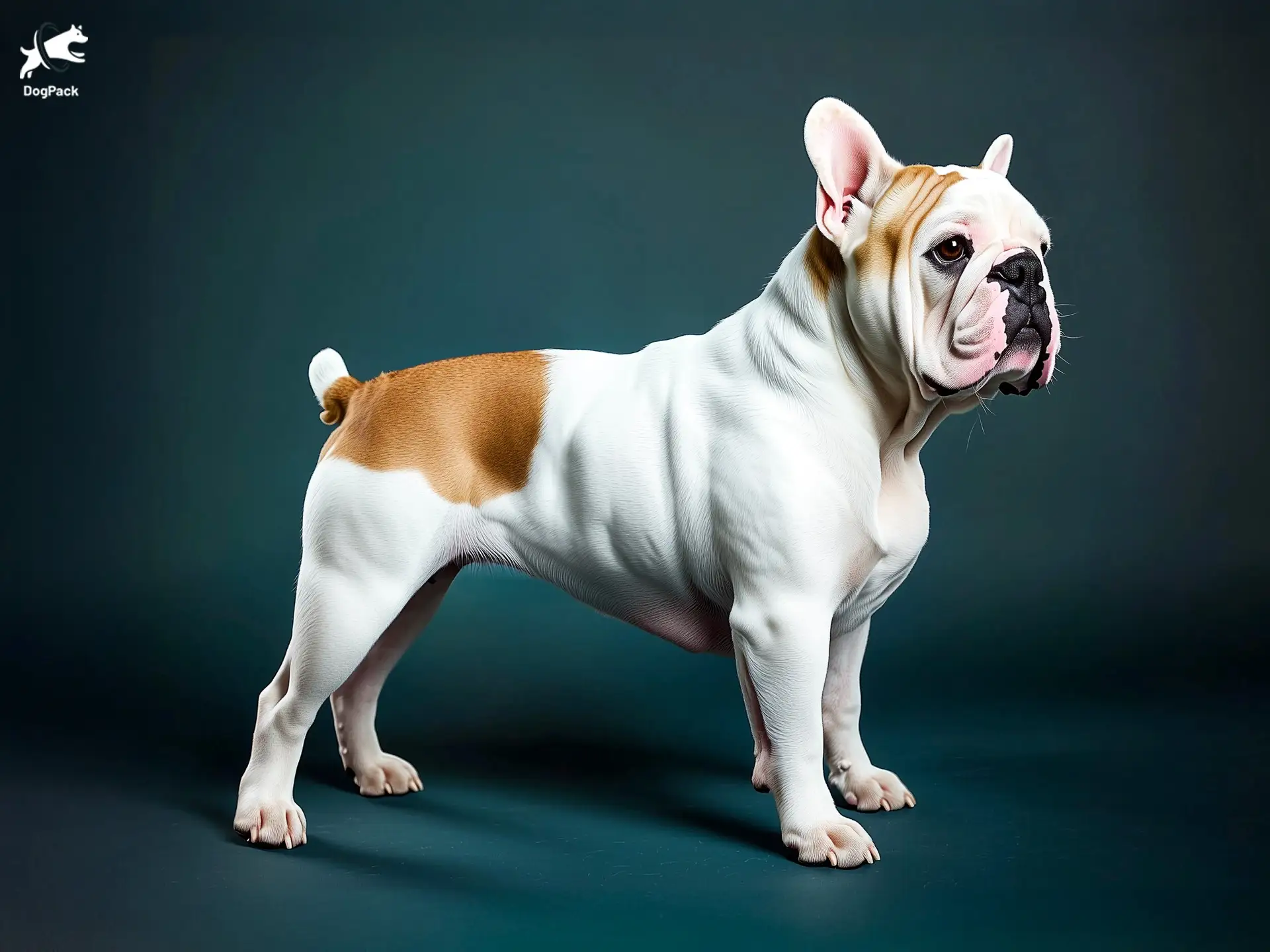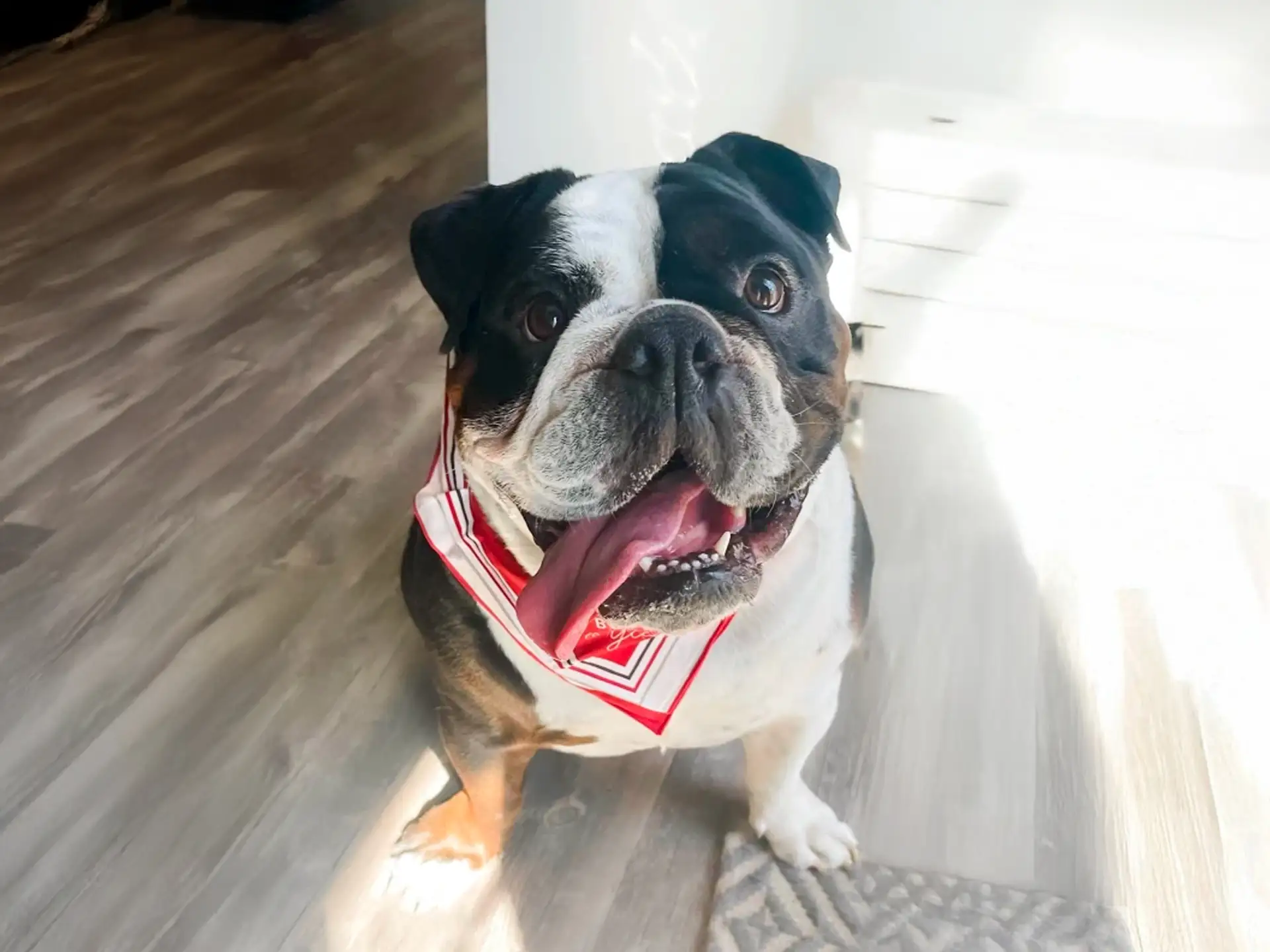English Bulldog Dog Breed Info & Overview
English Bulldogs, with their iconic wrinkled faces and sturdy build, are truly irresistible. Known for their gentle and loyal temperament, they make fantastic companions for people of all ages. Despite their robust appearance, these affectionate dogs are lovable couch potatoes who thrive on human connection and bring warmth and companionship to any household.
Characteristics
Pictures
Breed History
The English Bulldog has one of the most remarkable transformations in dog history. Originally bred in England for bull-baiting—a brutal sport now banned—they were fierce, fearless, and muscular, with a bite as big as their bark. But thankfully, breeders reimagined the Bulldog after the sport was outlawed, transforming them from tough fighters into gentle, lovable companions. They kept their signature tenacity, but now it’s directed towards loyalty and love.
In the 19th century, these Bulldogs faced possible extinction, but dedicated enthusiasts had a different vision. They softened the breed’s temperament, creating the affectionate and patient personality we know today. The English Bulldog even rose to national symbol status, embodying determination, resilience, and, yes, a bit of British stubbornness.
Fast-forward to today, and the English Bulldog is a family favorite. Known for their unique look and easygoing nature, they bring both humor and warmth into homes worldwide. Their journey from fighting ring to family room is a heartwarming testament to adaptability—and just how much humans can fall in love with a face full of wrinkles.
Temperament, Personality
English Bulldogs are famously easygoing and friendly—true couch companions who love their people just as much as their naps. You’ll find them lounging around, soaking up attention and giving it back with a side of sloppy kisses. They’re gentle and patient, especially with kids, making them a hit in families. And while they can be a tad stubborn, it only adds to their charm.
With proper socialization, they get along well with other animals. Strangers may be met with a bit of Bulldog caution at first, but they warm up quickly. Their laid-back attitude means they’re not prone to aggression, though they do like things their way—training might involve a little negotiation (or a treat or two).
Affectionate, loyal, and full of personality, English Bulldogs thrive in homes where they’re part of the action. Whether it’s a single person or a bustling household, this breed is happiest with plenty of human attention and a cozy place to nap.
Physical Characteristics
The English Bulldog’s look is nothing short of iconic: a broad, muscular build with a characteristic pushed-in nose, big expressive eyes, and a wrinkly face that’s impossible to resist. Those broad shoulders and wide head make them unmistakable, and their short, sturdy legs mean they carry a certain “waddle,” adding to their unique charm.
Their short coats come in various colors—brindle, white, fawn, and piebald—and require minimal grooming. Small, high-set ears fold neatly over, giving them a curious yet relaxed expression. And let’s not forget that underbite! The droopy jowls and sometimes-comical underbite make for the ultimate Bulldog look, endearing them even more to their fans.
Despite their robust look, English Bulldogs aren’t built for endurance. Their short noses can make breathing difficult, especially in hot weather, so they’re more inclined to stroll than sprint. But that just adds to their couch-loving lifestyle.
Health Issues
The Bulldog’s adorable physical traits, like their short nose and wrinkly skin, can lead to some health challenges. Their brachycephalic (flat-faced) structure means they’re prone to breathing issues, especially in warmer weather. Brachycephalic Airway Syndrome is common, so Bulldogs need a cool, shaded spot on hot days and a laid-back exercise routine.
They can also be prone to hip dysplasia and joint problems, so maintaining a healthy weight and regular check-ups are key. Their adorable skin folds, though cute, can sometimes harbor bacteria and lead to infections—routine cleaning helps keep them fresh and healthy.
Eye issues, like cherry eye, can pop up, and Bulldogs may also be prone to dry eye. Regular vet visits and attentive care are important to catch and treat any issues early, ensuring that your Bulldog stays comfortable and healthy.
Grooming Needs
The English Bulldog’s short coat makes grooming easy, but they still need some regular TLC. A weekly brushing keeps their coat shiny and reduces shedding. Those signature skin folds need a little extra attention, as they can trap moisture—regular cleaning prevents infections and keeps your Bulldog comfortable.
Bathing can be done every few weeks or as needed; a gentle, dog-friendly shampoo works best to avoid irritating their skin. Regular ear cleaning, nail trimming, and dental care round out their grooming routine. Brushing their teeth several times a week helps prevent dental issues, which is especially important as they’re prone to plaque buildup.
Grooming isn’t just about cleanliness; it’s a great bonding time with your Bulldog. They’ll love the attention, and you’ll appreciate the chance to keep an eye out for any skin or health issues.
Exercise Requirements
Bulldogs might not be sprinters, but they do need a bit of daily exercise to stay healthy. A couple of short, easy walks or some gentle playtime in the yard should do the trick. Because of their short noses, be mindful of exercising them in hot weather—they’re more of a “shade and chill” dog than a “sun and run” type.
Interactive toys and gentle games like tug-of-war or puzzle feeders keep them mentally stimulated. Bulldogs might surprise you with the occasional burst of energy, but they’re generally content with lounging around and taking it easy.
Since they’re prone to weight gain, moderate exercise is essential. Tailoring their activity level to their unique needs keeps them happy and fit—without the need for long-distance jogs!
Training Tips
Training an English Bulldog can feel a bit like negotiating with a toddler—they have their own ideas about what they want! Their stubborn nature means that patience and positive reinforcement are key. Treats and praise work wonders, but keep training sessions short and fun to hold their attention.
Socializing early helps them get along with other pets and people, and puppy classes can be a great start. Bulldogs respond best to consistency and clear rules, so stick to a routine that helps them understand expectations.
Avoid harsh corrections; these sensitive souls don’t respond well to negativity. Focus on building trust, and you’ll see that, underneath the stubbornness, they’re eager to please.
Nutrition, Diet
The English Bulldog’s diet needs to be balanced and portion-controlled to prevent weight gain, as they can be a bit prone to plumping up. They typically do well with 1.5 to 2 cups of high-quality dry dog food each day, divided into two meals.
Look for a diet that’s suitable for their age, whether they’re a playful puppy, an adult, or a senior with slower metabolism. Some Bulldogs have food sensitivities, so consult your vet if you notice any tummy troubles. Adding omega-3 fatty acids can benefit their skin and coat, which is especially helpful given their folds and wrinkles.
Fresh water should always be available, and treats should be given in moderation. A balanced diet keeps your Bulldog at their best and reduces the risk of weight-related health issues.
Adoption, Breeders
If you’re considering an English Bulldog, adoption is a wonderful choice. Organizations like the Bulldog Rescue Network specialize in rehoming Bulldogs and matching them with loving families. They can help find a Bulldog that’s perfect for your lifestyle.
If you decide to go through a breeder, choose one who prioritizes the health and well-being of their dogs. The Bulldog Club of America provides resources and reputable breeder referrals. Always ask for health clearances and try to meet the puppy’s parents if possible to get a sense of their temperament.
Avoid puppy mills or pet stores; responsible breeders or rescues will be happy to answer your questions and guide you through the adoption process.
Family Pet?
With their affectionate, gentle nature, English Bulldogs are fantastic family pets. They’re especially wonderful with kids, offering patience and love while being sturdy enough to handle gentle play. Their relaxed nature also makes them great for various living situations, from apartments to larger homes.
Supervision with young children ensures positive interactions. English Bulldogs generally get along well with other pets, especially if socialized from a young age. Their love for human companionship means they’re happiest in homes where they can be part of the family action.
Their easygoing demeanor and loyalty make them an ideal fit for families of all sizes, bringing warmth and smiles to any household.
Right For You?
Looking for a loyal, low-energy buddy who’s happiest by your side? The English Bulldog might be your perfect match. They suit owners who can provide moderate exercise, plenty of attention, and regular grooming. Their unique health needs mean you’ll need to be attentive, but the rewards are immeasurable.
They’re perfect for apartment dwellers and adapt well to various environments. If you’re dreaming of a hiking buddy, they may not be the best fit, but if you’re after a companion to relax with, they’re just right.
An English Bulldog brings love, laughter, and loyalty to any home—if you’re ready for their specific needs, they’ll be your devoted friend for life.
Conclusion
English Bulldogs are a delightful combination of loyalty, charm, and cuddles. With their gentle nature and unique look, they make fantastic companions for families, singles, and seniors alike. While they require some special care, the love and friendship they offer are more than worth the effort.
If you’re searching for a laid-back friend who loves to lounge by your side and is always ready to make you smile, the English Bulldog could be the perfect match. Their endearing personality and devotion make them a cherished addition to any home.
FAQs
-
How do English Bulldogs handle hot weather?
English Bulldogs are prone to overheating due to their short snouts. In warm weather, limit outdoor activities, provide plenty of water, and ensure access to cool, shaded areas or air conditioning.
-
Are English Bulldogs easy to train despite their stubbornness?
English Bulldogs can be a bit stubborn, so short, positive reinforcement-based training sessions work best. Consistency and patience are key, and they respond well to treats and praise.
-
Do English Bulldogs snore?
Yes, English Bulldogs are known for snoring due to their brachycephalic (short-nosed) structure. Their snoring varies by individual, but it’s generally a common trait in the breed.
-
Can English Bulldogs swim?
Due to their heavy build and short snouts, English Bulldogs are not natural swimmers and can tire quickly in water. Supervision and using a life jacket are essential if they’re near pools or bodies of water.
-
How often should you clean an English Bulldog’s wrinkles?
It’s best to clean their facial wrinkles daily to prevent moisture buildup, which can lead to infections. A gentle, damp cloth works well, and be sure to dry the folds thoroughly afterward.
Breed Ratings
English Bulldogs are moderately intelligent but can be stubborn, which may make training a bit challenging.
They enjoy playtime but are generally laid-back and not overly energetic.
With low to moderate energy, they prefer lounging over strenuous activity.
They shed moderately and benefit from regular brushing.
They have a low prey drive and are not typically inclined to chase.
Grooming is moderate; attention to skin folds is necessary.
Patience is required due to their stubborn nature; positive reinforcement works best.
They prefer company and may not do well when left alone for long periods.
Generally quiet, they are not known for excessive barking.
English Bulldogs tend to drool quite a bit, especially after eating or drinking.
They usually get along well with other dogs if socialized properly.
Prone to specific health issues; requires attentive care and regular vet visits.














